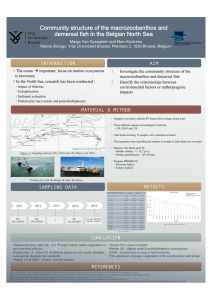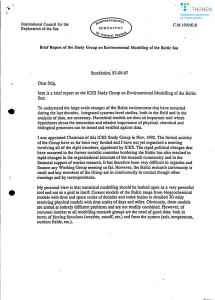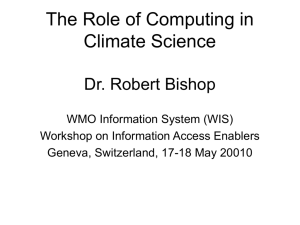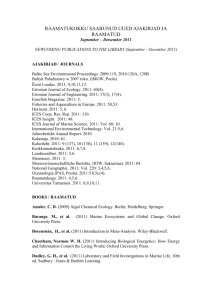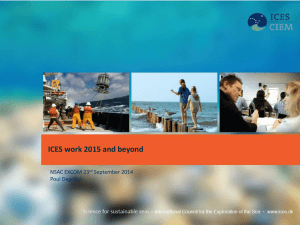ICES AND ACTIVITIES IN 1999/2000
advertisement
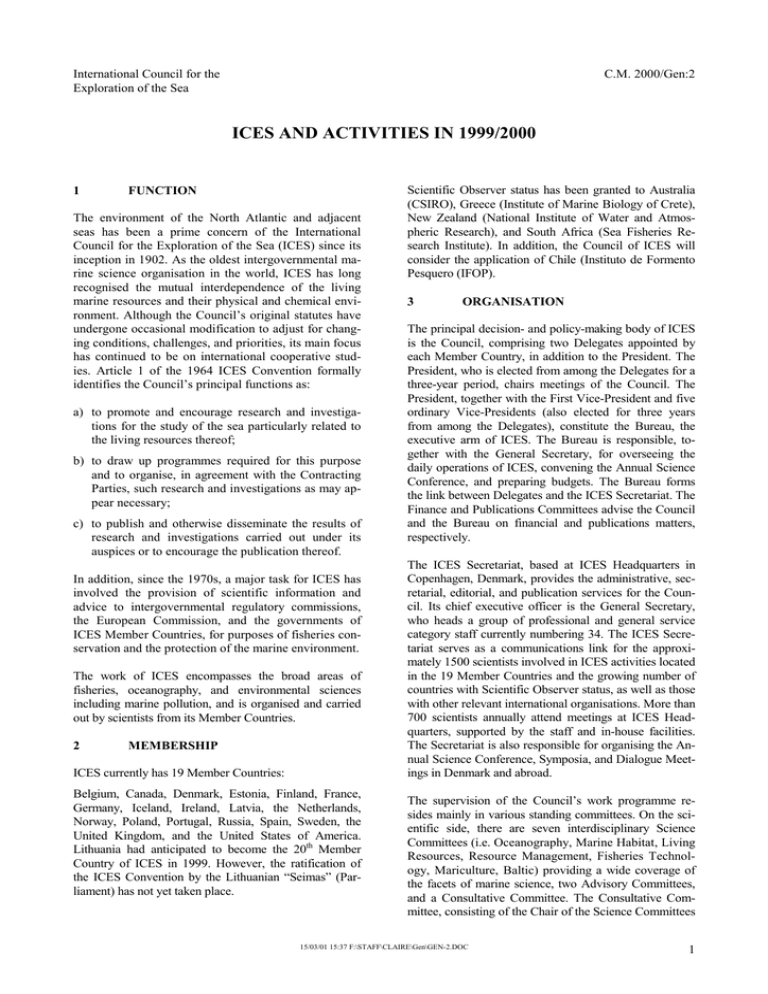
International Council for the Exploration of the Sea C.M. 2000/Gen:2 ICES AND ACTIVITIES IN 1999/2000 1 FUNCTION The environment of the North Atlantic and adjacent seas has been a prime concern of the International Council for the Exploration of the Sea (ICES) since its inception in 1902. As the oldest intergovernmental marine science organisation in the world, ICES has long recognised the mutual interdependence of the living marine resources and their physical and chemical environment. Although the Council’s original statutes have undergone occasional modification to adjust for changing conditions, challenges, and priorities, its main focus has continued to be on international cooperative studies. Article 1 of the 1964 ICES Convention formally identifies the Council’s principal functions as: a) to promote and encourage research and investigations for the study of the sea particularly related to the living resources thereof; b) to draw up programmes required for this purpose and to organise, in agreement with the Contracting Parties, such research and investigations as may appear necessary; c) to publish and otherwise disseminate the results of research and investigations carried out under its auspices or to encourage the publication thereof. In addition, since the 1970s, a major task for ICES has involved the provision of scientific information and advice to intergovernmental regulatory commissions, the European Commission, and the governments of ICES Member Countries, for purposes of fisheries conservation and the protection of the marine environment. The work of ICES encompasses the broad areas of fisheries, oceanography, and environmental sciences including marine pollution, and is organised and carried out by scientists from its Member Countries. 2 MEMBERSHIP ICES currently has 19 Member Countries: Belgium, Canada, Denmark, Estonia, Finland, France, Germany, Iceland, Ireland, Latvia, the Netherlands, Norway, Poland, Portugal, Russia, Spain, Sweden, the United Kingdom, and the United States of America. Lithuania had anticipated to become the 20th Member Country of ICES in 1999. However, the ratification of the ICES Convention by the Lithuanian “Seimas” (Parliament) has not yet taken place. Scientific Observer status has been granted to Australia (CSIRO), Greece (Institute of Marine Biology of Crete), New Zealand (National Institute of Water and Atmospheric Research), and South Africa (Sea Fisheries Research Institute). In addition, the Council of ICES will consider the application of Chile (Instituto de Formento Pesquero (IFOP). 3 ORGANISATION The principal decision- and policy-making body of ICES is the Council, comprising two Delegates appointed by each Member Country, in addition to the President. The President, who is elected from among the Delegates for a three-year period, chairs meetings of the Council. The President, together with the First Vice-President and five ordinary Vice-Presidents (also elected for three years from among the Delegates), constitute the Bureau, the executive arm of ICES. The Bureau is responsible, together with the General Secretary, for overseeing the daily operations of ICES, convening the Annual Science Conference, and preparing budgets. The Bureau forms the link between Delegates and the ICES Secretariat. The Finance and Publications Committees advise the Council and the Bureau on financial and publications matters, respectively. The ICES Secretariat, based at ICES Headquarters in Copenhagen, Denmark, provides the administrative, secretarial, editorial, and publication services for the Council. Its chief executive officer is the General Secretary, who heads a group of professional and general service category staff currently numbering 34. The ICES Secretariat serves as a communications link for the approximately 1500 scientists involved in ICES activities located in the 19 Member Countries and the growing number of countries with Scientific Observer status, as well as those with other relevant international organisations. More than 700 scientists annually attend meetings at ICES Headquarters, supported by the staff and in-house facilities. The Secretariat is also responsible for organising the Annual Science Conference, Symposia, and Dialogue Meetings in Denmark and abroad. The supervision of the Council’s work programme resides mainly in various standing committees. On the scientific side, there are seven interdisciplinary Science Committees (i.e. Oceanography, Marine Habitat, Living Resources, Resource Management, Fisheries Technology, Mariculture, Baltic) providing a wide coverage of the facets of marine science, two Advisory Committees, and a Consultative Committee. The Consultative Committee, consisting of the Chair of the Science Committees 15/03/01 15:37 F:\STAFF\CLAIRE\Gen\GEN-2.DOC 1 and the Advisory Committees, plus a Chair elected by the Committee, oversees all aspects of the Council’s scientific work. The primary means by which the actual work is planned, coordinated, conducted, appraised, and reported on for subsequent peer-review, are the large number of Study/Working, Planning, and Steering Groups and Workshops. These entities are established as needed by the Council, upon the recommendation of the respective bodies, and maintained for as long as necessary to address the questions and terms of reference assigned to them. Each group has a parent committee to which it reports progress and from which it receives instructions, as necessary, for further work. All Member Countries are entitled to appoint members to any of these groups. With the exception of meetings of 1) fish-stock assessment Working Groups, whose members must be appointed by Delegates or approved by the General Secretary for special purposes (e.g. facilitating Third World development), and 2) groups whose members might be restricted to particular experts appointed by the Council, observers from non-Member Countries and international scientific organisations may be invited to attend the meetings of groups at the discretion of Chairs after consultation with the General Secretary. ICES currently has more than 100 Working, Study, Planning, and Steering Groups and Workshops forming the basis for its annual work programme. Subjects include such wide ranging fields as marine chemistry; sediments; physical oceanography; environmental impact of mariculture; fish diseases, behaviour, and genetics; ecology of benthos, plankton, fish, seabirds, and marine mammals; biological effects of contaminants; trend monitoring; marine data management and statistics; single- and multispecies fish-stock assessments; fishing technology; and surveys for fish eggs, larvae, juveniles, and adults. 3.1 Scientific and Advisory Functions 3.1.1 Fisheries An important responsibility of ICES is the coordination of fisheries-related scientific research. This comprises monitoring the abundance and composition of fish stocks in the Northeast Atlantic, including developing appropriate methods to estimate fish-stock abundance, collecting statistics on fish catches, fishing effort, relevant biological data on the various life stages of fish, recruitment to fish stocks, and multispecies interactions and their effects on individual fish stocks. ICES is the official advisory body to the following commissions: à North-East Atlantic Fisheries Commission (NEAFC); à International Baltic Sea Fishery Commission (IBSFC); à North Atlantic Salmon Conservation Organization (NASCO); à Commission of the European Union (EC). 2 These commissions and the governments of ICES Member Countries formulate requests to ICES for information and advice related to the management of specific stocks of fish. ICES Rules of Procedure state that “The Advisory Committee on Fishery Management (ACFM) shall be responsible for scientific information and advice on living resources and their exploitation” on behalf of the Council. In formulating its advice on the management of 90-100 stocks of fish and shellfish, ACFM utilises information prepared by numerous stock assessment Working Groups. ACFM meets twice a year (summer and late autumn) to prepare its advice, which is published annually in the ICES Cooperative Research Report series. 3.1.2 Marine Environment ICES also provides scientific information and advice on matters related to the marine environment through its Advisory Committee on the Marine Environment (ACME). ICES Rules of Procedure also state that “The Advisory Committee on the Marine Environment (ACME) shall be responsible for scientific information and advice on the status of the marine environment (including marine pollution) and its consequences on living resources and related human activities”. ICES provides such services to Member Country governments and the following commissions: à OSPAR Commission (Convention for the Protection of the Marine Environment of the North-East Atlantic); à Helsinki Commission - Baltic Marine Environment Protection Commission (HELCOM, Convention for the Protection of the Marine Environment of the Baltic Sea Area). As a basis for this advice, ACME reviews the reports of approximately 20 Working Groups that coordinate work on various topics related to the marine environment and marine contamination. ACME normally meets annually and publishes its report in the ICES Cooperative Research Report series. Although the Advisory Committees were initially established to address largely different areas of interest, there is an increasing need for interdisciplinary advice, particularly in relation to the interaction between the exploitation of living resources and the environment and ecosystems. For this reason, the two Advisory Committees now collaborate in preparing their advice and, when appropriate, issue joint reports. 3.1.3 Oceanography Oceanographic investigations form an integral part of the ICES programme of multidisciplinary work aimed at understanding the features and dynamics of water masses and their ecological processes. Special emphasis is placed on the influence of changes in the environment on the distribution, abundance, and population dynamics of utilised fish resources. This theme is an important element of the new project of the International Geosphere- 15/03/01 15:37 F:\STAFF\CLAIRE\Gen\GEN-2.DOC Biosphere Programme called GLOBEC (Global Ocean Ecosystem Dynamics) in which ICES plays a key implementation role via the North Atlantic Regional Office of GLOBEC which is located in the ICES Secretariat. Oceanographic investigations are also directly relevant to marine pollution studies in view of the influence oceanographic conditions have on the distribution and transport of contaminants in the marine environment. ICES promotes the development and calibration of oceanographic equipment and the maintenance of appropriate standards of quality and intercomparability of oceanographic and environmental data. 3.2 Databases Databases serve as the foundation for objective assessments of the status of the marine environment and its living resources. The ICES Secretariat maintains some of the world’s largest fisheries, contaminants/pollution, and oceanographic databases. In the area of fisheries, ICES maintains a computerised databank containing detailed information relevant to fish-stock assessment, data from quarterly International Bottom Trawl Surveys in the North Sea, and catch statistics for the Northeast Atlantic. ICES is the oldest international data centre for marine contaminants, including data from its Cooperative Monitoring Studies Programme and from the Oslo and Paris Commissions' Joint Monitoring Programme covering contaminants in biota, sea water, and sediments. ICES also served as the centre for environmental and biological data used in the work of the North Sea Task Force, and has a formal agreement with the Arctic Monitoring and Assessment Programme (AMAP) to act as its thematic data centre for the marine component. ICES also serves as the data centre for HELCOM’s Baltic Monitoring data. ICES maintains a bank of oceanographic data supplied by Member Countries, dating back to the early 1900s. Data submissions are subject to intense quality control, thus providing some measure of validation. This databank is supplemented by an inventory of cruise information, based on Reports of Oceanographic Cruises and Data Stations (ROSCOP), which summarises all cruise activities in Member Countries related to physical oceanographic, marine biological, pollution, fisheries, and geophysical research. 3.3 Coordination of Cooperative Programmes ICES has played an active role in coordinating cooperative research programmes in the North Sea and elsewhere in the ICES area (North Atlantic including the Baltic Sea). One of the best known of such recent enterprises was the North Sea Task Force (NSTF), which was established jointly by ICES and the Oslo and Paris Commissions following the Ministerial Declaration made at the Second International Conference on the Protection of the North Sea in London, UK, in 1987. Among other activities, the North Sea Task Force initiated measures for enhancing the scientific knowledge and understanding of the North Sea. As a result, the North Sea Quality Status Report 1993 (1993 QSR) was published, provid- ing a “dependable and comprehensive statement of circulation patterns, inputs and dispersion of contaminants, ecological conditions, and effects of human activities in the North Sea”. ICES was invited by the Nordic Council of Ministers to contribute towards a feasibility project to provide input that might be of use towards certification of sustainable fisheries. The Nordic Council of Ministers wished to develop an ‘information programme with the aim to provide consumers, as well as the public in general, with reliable information on fisheries, to enhance knowledge and public awareness including a report by ICES on North-East Atlantic fish stocks’. In terms of the area to be covered, it was considered that this should cover the Baltic Sea, the North Sea and the North-East Atlantic, and the areas of the Arctic without permanent ice cover (e.g., the Barents Sea). Later, the Nordic Council of Ministers included the West Greenland areas in the project. The report, presented in February 2000, (ref. Nord 2000:10) contains information on the effect of fisheries on the fish stocks and on the marine ecosystems of the above-mentioned areas. The impact of environmental conditions on the fish stocks is also considered, along with concentrations of contaminants in several species of fish and shellfish, and the occurrence of diseases in fish and shellfish. The report was prepared by the ICES Secretariat with the assistance of Poul Degnbol, Institute of Fisheries Management and Coastal Community Development, Denmark, and Carolyn Symon, Scientific Writing and CopyEditing Services, United Kingdom. 3.4 Publications Since its inception, ICES has published well over a thousand periodicals and monographs. Relative to its function of publishing and disseminating results of research, the Council organises scientific symposia and other meetings, which are open to participants from both Member and non-Member Countries. The following series are available to the scientific community and the general public: • ICES Journal of Marine Science • ICES Marine Science Symposia (Symposium proceedings formerly published in this series will appear as special numbers of the ICES Journal, above) • ICES Cooperative Research Report • ICES Fisheries Statistics • ICES Oceanographic Data Lists and Inventories (now available on Internet) • ICES Identification Leaflets for Plankton • ICES Identification Leaflets for Diseases and Parasites of Fish and Shellfish 15/03/01 15:37 F:\STAFF\CLAIRE\Gen\GEN-2.DOC 3 • ICES Techniques in Marine Environmental Sciences • ICES Annual Report • ICES/CIEM Information (Newsletter) 3.5 Collaboration With Other International Organisations The Council has continued its active cooperation during the past year with other international organisations, including those to which it provides scientific information and advice in the areas of fisheries management, and marine environmental protection. More than 40 international organisations have observer status and cooperative relations with ICES. Of the United Nations agencies, ICES works actively with the Fisheries Department of the Food and Agriculture Organization (FAO), the Intergovernmental Oceanographic Commission of UNESCO, the International Maritime Organization (IMO), the World Meteorological Organization (WMO), and the United Nations Environment Programme. Other organisations with which ICES co-operates range from the Arctic Monitoring and Assessment Programme (AMAP) to the World Wide Fund for Nature (WWF). ICES and the international commissions (e.g., European Commission, Helsinki Commission, OSPAR Commission, International Baltic Sea Fishery Commission, North Atlantic Salmon Conservation Organization, North-East Atlantic Fisheries Commission), to whom ICES provides scientific information and advice for conservation of living marine resources and the protection of the marine environment, conduct their working relationships through Memoranda of Understanding. they benefit from scientific advice from ICES. Therefore they accept financial responsibility for genuine ICES’ costs of providing this advice, including: (i) the costs of databases and analyses that are needed in order to prepare advice, but generally would not occur otherwise, and (ii) the preparation, quality assurance, and delivery of the advice. Observers reports on some of the meetings of these organisations at which ICES was represented by Observers will be issued at the 2000 Annual Science Conference as Doc. C.M. 2000/Gen:1. 4 MEETINGS AND OTHER ACTIVITIES ORGANISED BY THE COUNCIL 4.1 Bureau and Subsidiary Groups The Bureau (Chair: Dr S. Parsons, President of ICES) held its Meeting in Copenhagen, from 3-4 February 2000 to review and approve the draft ICES Secretariat Workplan for 1999/2000, and to consider key ICES issues. The Mid-Term Meeting of the Bureau was held at ICES Headquarters from 15-17 June 2000. The Bureau will meet again on 25 September 2000 in Brugge (Bruges), Belgium immediately prior to the 2000 Annual Science Conference (88th Statutory Meeting). ICES and the Commissions consider themselves to be partners working towards a common goal of scientifically based conservation and management of fisheries and the marine environment. However, in order to achieve this mission, ICES and the Commissions have different, but complementary, roles. The ICES role is to foster the carrying out of a programme of marine science, hereafter referred to as the “Core Science Programme” of ICES, to increase scientific understanding of marine systems, and to create and/or enhance the capacity to provide advice on conservation and management of fisheries and the marine environment. This Core Science Programme includes basic scientific research, development of scientific methods including those methods for providing advice which are of broad interest, databases of broad scientific importance and the broad dissemination of scientific knowledge. The cost of the Core Science Programme is the responsibility of ICES. It is the role of the Commissions to formulate policies and/or management actions for conservation of fisheries and the marine environment, and in order to do so 4 15/03/01 15:37 F:\STAFF\CLAIRE\Gen\GEN-2.DOC 4.2 Advisory Committees 4.2.1 ACFM ACFM (Chair: Tore Jakobsen) has held two meetings, both at ICES Headquarters, since the 1999 ICES Annual Science Conference, the first from 25 October to 2 November 1999 and the second from 25 May to 1 June 2000. At both of these meetings the first three days were held in Sub-Groups to which the Chairs of relevant Assessment Working Groups were invited, followed by a plenary meeting. All nationally nominated members and the Chair of one Science Committee were present at the meeting in October 1999. Observers from EC DG-Fish (O. Hagström), NAFO (M. Kingsley), the Faroe Islands, and the Greenland Home Government (H. í Jakupsstovu and J. Boje, respectively (both part-time)) also attended the meeting. The Chairs of five Stock Assessment Working Groups were also present for the Sub-Group meetings. All nationally nominated members, a Chair and representatives of two Science Committees (part-time) were present at the meeting in May/June 2000. The Chairs of the seven Stock Assessment Working Groups, the reports of which were being discussed (for the SubGroups) were also present. Observers from EU DGFish (O. Hagström), the Faroe Islands and Greenland Home Government (J. Reinert and J. Boje, respectively (both part-time) also attended the meeting. The Chairs of seven Stock Assessment Working or Study Groups were present at the Sub-Groups prior to the plenary sessions of ACFM. 4.2.2 ACME ACME (Chair: H.R. Skjoldal) held an extraordinary meeting at ICES Headquarters on 26 January to 2 February 2000 to handle three special requests: 1) scientific peer review of the OSPAR Quality Status Report 2000, 2) scientific review of the IMPACT II report and preparation of scientific advice for EC DG-FISH, and 3) finalisation of a report on “Status of Fisheries and Related Environment of Northern Seas” for the Nordic Council of Ministers. Members were present at the meeting from all member Countries, as well as the Environment Adviser, the ICES Oceanographer (part time), the ICES Fisheries Adviser (Part time), the chair of the Working Group on Ecosystem Effects of Fishing Activities (Dr J. Rice), and the consultants who worked on the report for the Nordic Council (P. Degnbol and C. Symon). The Committee carried out the work requested and the resulting material was forwarded to the respective bodies after the meeting. The Nordic Council published the status report during the summer (ref. NORD 2000-10). at the meeting from all Member Countries except the Netherlands. The Environment Adviser participated as well as the ICES Oceanographer (part-time), the ICES/GLOBEC Coordinator (part-time), the Chair of the Working Group on Statistical Aspects of Environmental Monitoring (S. Uhlig), and the Chair of the Working Group on Marine Mammal Habitats (Dr A. Bjørge) (part-time). The Committee compiled scientific information and advice on topics requested by the OSPAR Commission and the Helsinki Commission (HELCOM), particularly on quality assurance of marine monitoring, statistical aspects of the detection of trends in inputs of contaminants via rivers and the atmosphere, and potential impacts of the disposal of fish offal and discharges into the Baltic Sea. In addition, ACME completed and adopted a chapter, entitled “Marine, Migratory and Freshwater Fish in the Sea Area”, for the HELCOM Fourth Periodic Assessment of the Marine Environment of the Baltic Sea, 1994-1998. It also prepared information and advice on other topics of interest to ICES Member Countries, including information on specific marine contaminants, fish disease issues, introductions and transfers of marine organisms, marine habitat mapping, and effects of extraction of marine sand and gravel on marine ecosystems. ACME also discussed potential frameworks for ecosystembased environmental advice and integrated environmental assessments. 4.2.3 Consultative Committee The Mid-Term Meeting of the Consultative Committee (Chair: Dr R.M. Cook) was held at ICES Headquarters from 12–14 June 2000 in accordance with C.Res.1999/2A01 to prepare a draft programme of sessions for the 2000 Annual Science Conference In Brugge (Bruges), Belgium, and to address other Terms of Reference set by the Council at the 1999 Annual Science Conference. 4.2.4 Study/Working Workshops Group Meetings and The meetings of Working, Study, and other Groups and Workshops specified in C.Res.1999/2ACFM01–3G02 took place as planned, except for the Study Group on Baltic Herring and Sprat Maturity, and the Planning Group for Pelagic Acoustic Surveys in Sub-Areas VIII and XI. The former had to be cancelled because insufficient material was available to allow the Study Group to address its terms of reference. The latter did not take place because the objectives and deadlines for the acoustic surveys had already been defined at the first meeting of the EC project PELASSES. Changes also had to be made in the dates The regular meeting of ACME was held at ICES Headquarters from 5–10 June 2000. Members were present 15/03/01 15:37 F:\STAFF\CLAIRE\Gen\GEN-2.DOC 5 and/or venues of some other groups. The reports of Groups concerned with fish stock assessments which met from November 1999–May 2000 were reviewed by ACFM at its meeting from 29 May to 1 June 2000 (C.Res.1999/2ACFM01). The reports of Groups concerned with marine pollution and marine environmental protection matters were reviewed by ACME at its meeting from 5-10 June 2000 (C.Res.1999/2ACME01). 4.3 Symposia The following ICES International Symposia have been held during the current ICES year: The Symposium on “Fisheries and Plankton Acoustics” (Conveners: Dr F. Gerlotto; Dr J. Massé, France) will be held in Montpellier, France, from 10 -14 June 2002 (C.Res. 1997/2:1). A Scientific Steering Committee will be established to assist the Co-Conveners in planning the Symposium. Co-sponsorship is being sought from appropriate international organisations. For the Hydrobiological Variability meeting, the Scientific Steering Committee has been established. The cosponsors are IOC, NAFP, CEFAS (Lowestoft), FRS Marine Laboratory (Aberdeen), and Institut für Meereskunde (Hamburg). For 2001 there is a second ICES Symposium: “Capelin – What Are They Good For?” (see general information on our Symposia Website). 5 PUBLICATIONS ICES publications are a key mechanism for the dissemination of the results of scientific research and advice. Eight issues of the ICES Journal of Marine Science (Journal du Conseil) will have been published during the ICES year 1999/2000 including these issues of special interest: Volume 56(5), pages 571–794, was off press during its cover month, October 1999, and distributed in November. Volume 56(6), pages 795–1074, with a cover date of December 1999, was off press and distributed in February 2000. It includes the proceedings of the ICES Symposium on “Confronting Uncertainty in the Evaluation and Implementation of Fisheries Management Systems”, which was held in Cape Town, South Africa, from 16 to 19 November 1998. It is the seventh of the ICES Symposium numbers to be published in this series, and it was also registered as Volume 207 in the ICES Marine Science Symposia series. pods in the Food Chain and Their Interaction with the Environment”. Volume 57(2), pages 189–464, was off press in early June 2000. It was issued as “Recruitment Dynamics of Exploited Marine Populations: Physical-Biological Interactions. Part 1” and stems from the ICES Symposium held in Baltimore, Maryland, USA, from 22 to 24 September 1997. Part 1 contains 27 papers, the number delivered by the Guest Editor by 1 January 2000. Originally projected as a proceedings volume Volume 57(3), pages 465–792 was off press in August. It contains 37 articles stemming from the ICES/SCOR Symposium on the “Ecosystem Effects of Fishing”, which was held in Montpellier, France, from 16 to 19 March 1999. This was the tenth set of symposium proceedings to be issued in this series, and it was also registered as Volume 210 in the ICES Marine Science Symposia series. Volume 57(4), pages 799–1293, will be a standard issue containing articles on different topics. It will be nearly four times the size of a normal number to accommodate the overflow caused by the need to publish six Symposium Volumes in close succession. Volume 57(5) or (6) will carry the proceedings of the ICES Symposium on “Marine Benthos Dynamics: Environmental and Fisheries Impacts”, based on the meeting held on Crete, Greece, from 5 to 7 October 1998. Volume 57 (6) is scheduled to carry the proceedings of the ICES Symposium on “Population Dynamics of Calanus in the North Atlantic”, stemming from the meeting held in Tromsø, Norway, from 24 to 27 August 1999. In 1996 Academic Press launched IDEAL (International Digital Electronic Access Library) and APPEAL (Academic Press Print and Electronic Access Licence) on the World Wide Web for its serial publications, including the ICES Journal. IDEAL makes tables of contents and abstracts, inter alia, available to any WWW user, and APPEAL provides facsimile texts of full articles on a site-licence basis. Full-text versions of articles in the ICES Journal are thus available to a very wide public, and Academic Press has continued to take other initiatives to increase awareness of its contents. The first tangible results were seen in the report on the ICES/Academic Press joint account for 1998, showing an income of GBP 1,113 from the site-licensing system (ca. 10% of total revenues). Volume 57(1), pages 1–187, with a cover date of February 2000, was published and distributed in April. In addition to standard articles it contains selected papers from the 1998 ASC Theme Session on “Impact of Cephalo- 6 15/03/01 15:37 F:\STAFF\CLAIRE\Gen\GEN-2.DOC Numerous issues of ICES Identification Leaflets for Plankton, ICES Identification Leaflets for Diseases and Parasites of Fish and Shellfish, ICES Cooperative Research series, and ICES Techniques in Marine Environmental Sciences have been published. 5.9 ICES Annual Report 6 SECRETARIAT MATTERS The total number of persons employed in the ICES Secretariat on a permanent basis during the current Financial Year is 34. These persons have occupied 10 posts at the Professional level, and 24 posts at the General Service level. The ICES Annual Report for 1998/1999 was issued in March 2000. 5.10 ICES/CIEM Information Issue No. 35 of this newsletter was issued in May 2000, and No. 35 has been issued in September 2000, in both Web and paper versions. 15/03/01 15:37 F:\STAFF\CLAIRE\Gen\GEN-2.DOC 7
